To prepare runners for the upcoming Straits Times Run, top Singaporean marathoner Mok Ying Ren, 29, had shared some race execution tips at a running clinic at Suntec City recently.
The Straits Times Run takes place on Sunday July 16 with three different categories to cater to runners of different abilities – 18.45km, 10km and 5km.
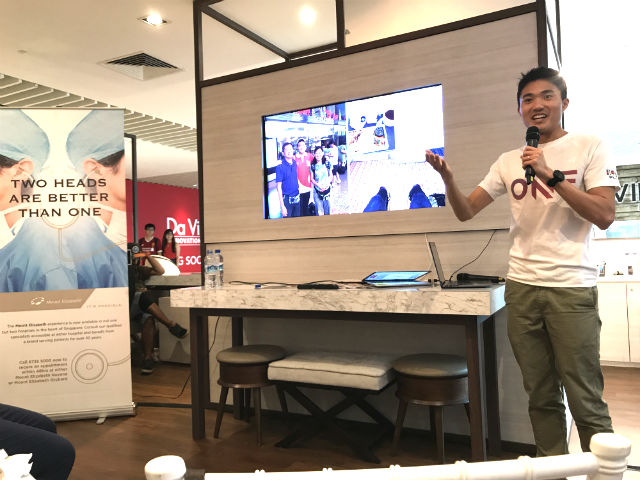
Mok shares race execution tips with runners.
Said Mok, “To prepare for my races I don’t really do anything different compared to you guys. In terms of my food intake, I will eat everything but in moderation. I want to show that all of us are in the same position – we are runners who love to run, but we all get nervous when we have a big race.”
Reflecting back to his 2013 South East Asian Games Marathon in Myanmar, where he had won the gold medal, Mok used his experience to share with runners, on how to execute a good race.
Before the Race
Prior to a race, Mok recommends doing some degree of carbo loading.
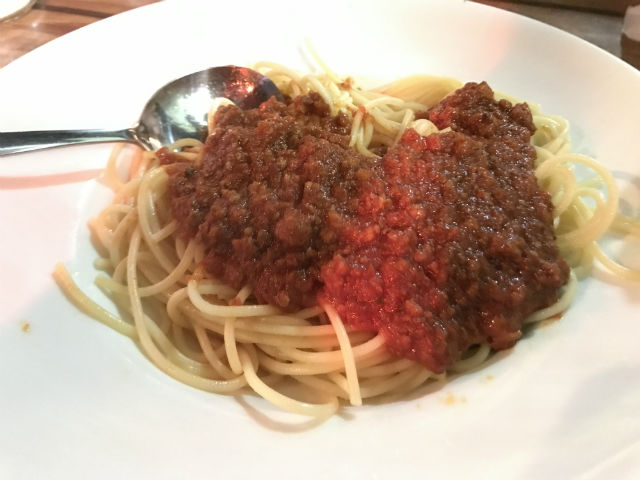
Mok recommends runners to carbo load before a race.
Carbo loading is a strategy used by endurance athletes to maximise the storage of glycogen in their muscles and liver, so they increase their intake of foods that are rich in carbohydrates.
He said “I do a moderate amount of carbo loading 2 – 3 days before a marathon where I take more rice and pasta than usual. There is not a lot of scientific evidence that this works, but since everyone does it, I also do it.”
Race Morning
And on the race morning, Mok suggests that runners should eat a healthy breakfast containing plenty of whole grain carbs.

Mok, pictured here with his wife Belinda, receives a pleasant birthday surprise after his talk at the running clinic.
He said “Eating breakfast is an individual preference but there is science backing why you should eat breakfast – when you are sleeping, you are breathing and your heart is still beating, so energy is being used. Glucose is the main store of energy in the body; it goes up after dinner but after sleeping it goes down again, so you need to eat breakfast to bring it back up again to have energy for your race.”
Added Mok “Eat brown rice or whole grain bread that is low in GI (glycemic index). Low GI foods make you feel full longer – if you eat these foods at home, you won’t be hungry upon reaching the race site. You cannot just eat energy gels for breakfast. They are very high in glucose and will be absorbed by the body too quickly. Fruits are good though; they are low in GI because they have fibre that slows down digestion.”
Mok himself has a mixture of low and high GI foods for breakfast before his races. These include bread, bananas, cereals and soya milk. Said Mok “For my last few races, I was trying whole grain bread with hummus. I like the flavours.”
To Mok, coffee is also important on race mornings. He said “Caffeine can boost your performance on race day. It also helps you to stay awake.”
Warming Up
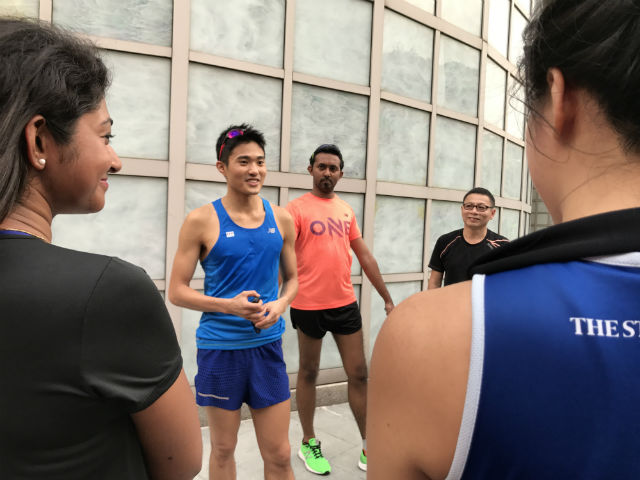
Mok demonstrates to runners how to warm up before a run.
In terms of warming up prior to a race, Mok feels that this is not really necessary for a long race such as the half marathon or full marathon, but more important for a short race such as the 5km or 10km event. He explained, “If I am running the 5,000m, I would do about 10 – 15 minutes of easy jogging. But for a half marathon, I do three minutes of running to warm up my muscles; however for those aiming to complete a half marathon in 2 1/2 hours or longer, just start the race slowly at an easy effort and use that as your warm up.”
He added “For the marathon, it is the same. If you are running four hours or longer, just go to the start line and begin the race slowly. Your warm up pace will be similar to your marathon pace so there’s no point in running for an extra 10 minutes before the marathon.”
He does not really believe in stretching exercises to warm up the muscles; to Mok, walking or jogging is enough to get the muscles ready for the exercise ahead.
Race Strategy and Pacing
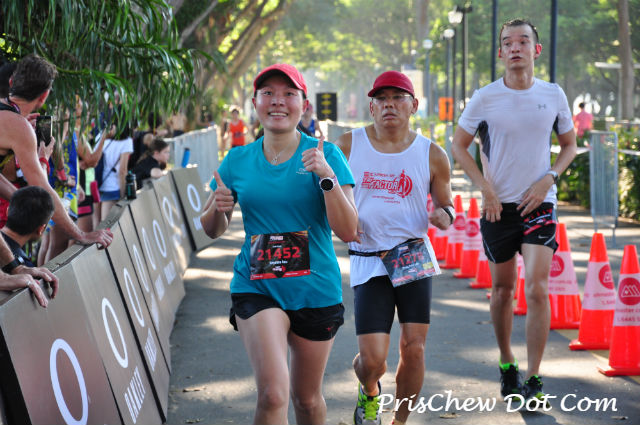
Many runners tend to adopt a positive splits strategy when they run; Mok advises that this is not ideal.
Mok also shared some tips on race strategy and pacing. He said “Many people think that they should run faster in the first half so that they have time to rest and slow down in the second.”
This strategy is known as positive splits, where the runner starts strongly but fizzles out and slows down in the latter stages of the race.
Said Mok “This is the wrong way to go about running a race.”
So to illustrate his point, Mok pointed out that most of the marathon world records at the top level, were achieved with a negative split strategy.
Negative splits on the other hand, is when the runner starts conservatively but speeds up and finishes strong in the latter stages of the race.
For example, as Mok shared, Dennis Kimetto in 2014, ran the Berlin Marathon with split times of 61:45 minutes in the first half, and 61:12 in the second half. He finished his run in the current marathon world record time of 2:02:57 hours.

With Mok Ying Ren.
Haile Gebrselassie also ran negative splits in setting the then world record of 2:04:26 hours in 2007, at the Berlin Marathon that year, running 62:29 minutes in the first half and 61:57 minutes in the second half of the race.
Said Mok, “It pays to start off slow for the marathon; it always feels good to overtake people in the last 5km of the run – their mettle has been crushed already and if you push harder, that feeling is great.”
A third way to pace a race would be to go for even splits, that is, to run the first and second half with exactly the same split times. This strategy is often used by marathon pacers.
In order to know your pace, Mok suggests that you should do some training runs at your targeted marathon race pace, and gauge how the body feels about sustaining the pace for the marathon.
And in terms of fuelling for a race, Mok recommends using high GI foods such as sports drinks and power gels. He said “I take one gel every 45 minutes to one hour.”
And for drinking, Mok says that you should drink early during the race, but only drink to quench your thirst and not to over-drink.
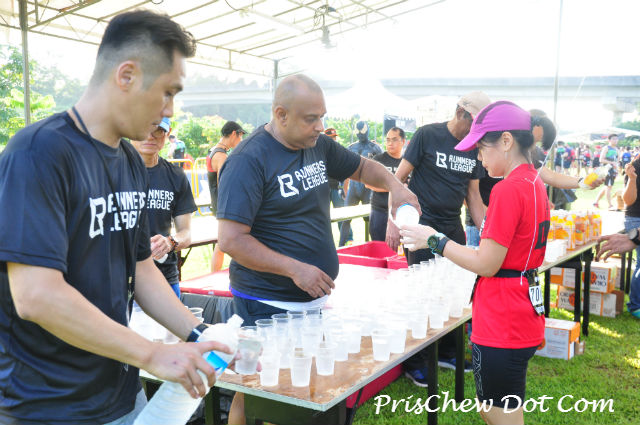
Drink during a race, but do not over-hydrate yourself though.
Mok pointed out the dangers of over-hydration. Said the runner, “Last time they used to say to drink beyond the point of thirst. But many people who visit the medical tent at races have drunk too much; this is especially the case for 7 – 8 hour marathoners. People think they need to drink because they are tired, but if you drink so much your body salts get diluted and the sodium level drops and drinking even more, will cause lethargy, fainting or loss of consciousness, a condition known as hyponatraemia.”
To gauge whether if you have over drunk, Mok suggests that you should weigh yourself in the morning before the race, and again after the race, If you have gained weight, you have drunk too much fluids.
He said, “It is common to lose two per cent of your body weight in fluids, and not lose performance.”
1.75km practice run
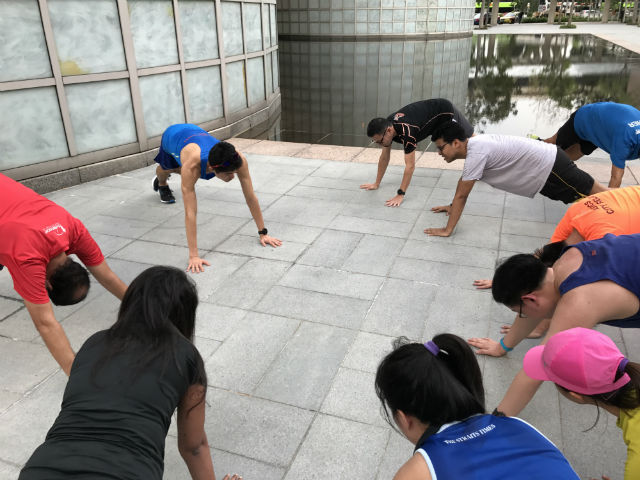
We did core exercises like planks, after the training run.
Following the sharing session, Mok led runners on a short 1.75km run around the Suntec City area, leading runners through a thorough warm-up and cool-down as well. It was a slow run, giving us all the opportunity to chat further to him and ask him questions.
Mok then finished off the session with some planks and other core strengthening exercises – after which, runners then crowded around the national runner, to take pictures with him.

Leave a Comment